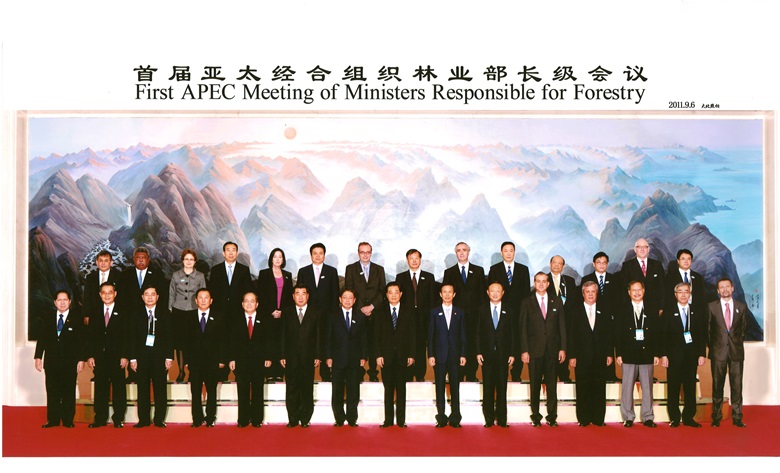2011 First APEC Meeting of Ministers Responsible for Forestry

We, the Ministers and senior officials attending the First APEC Meeting of Ministers Responsible for Forestry, held in Beijing, China on 6-7 September 2011,
Realizing that the world economy is recovering from the global financial crisis while still facing such challenges as resource and energy constraints, climate change, loss of biological diversity, poverty and food insecurity; and that improved management, conservation and rehabilitation of forests can make a significant contribution to the economic, environmental and social priorities and goals of the APEC economies and that enhanced international cooperation is needed to address these challenges;
Recalling the 2007 Sydney APEC Leaders’ Declaration commitments to increase forest cover in the region by at least 20 million hectares of all types of forests by 2020 and to establish the Asia-Pacific Network for Sustainable Forest Management and Rehabilitation;
Recalling also the 2010 Yokohama APEC Leaders’ Declaration to “enhance work on meeting the aspirational goal in the Sydney Declaration and instruct our officials to take concrete steps toward this goal, and to enhance our cooperation to address concerns with illegal logging and associated trade and to promote sustainable forest management and rehabilitation”;
Reaffirming the United Nations Conference on Environment and Development Forest Principles and the United Nations Non-Legally Binding Instrument on All Types of Forests, and noting that they have raised awareness of the important roles and contribution of forests in socio-economic development, ecological, sustainability, poverty eradication, climate change, and green growth which is one of the priorities to be discussed at the 19th APEC Economic Leaders’ Meeting;
Recognizing that forestry, with its unique roles and contribution to sustainable development, has the potential to be a leading sector in achieving green growth;
Welcoming the Cancun agreements which include policy approaches and positive incentives on issues relating to reducing emissions from deforestation and forest degradation in developing economies and also include the role of conservation and sustainable forest management as well as the enhancement of forest carbon stocks in developing economies;
Bearing in mind the natural and socio-economic diversity of the APEC economies, their different development needs and objectives, and the great challenges related to the conservation, sustainable management and rehabilitation of the region’s forests in support of green growth and sustainable development, we aspire to:
1. Maintain and further strengthen the political commitment in support of sustainable forest management, forest conservation and forest rehabilitation;
2. Facilitate implementation of forest-related agreements and foster a common understanding on sustainable forest management, through existing international processes such as the United Nations Forum on Forests, the International Tropical Timber Organization, and the Montréal Process on Criteria and Indicators for the Conservation and Sustainable Management of Temperate and Boreal Forests;
3. Strengthen international cooperation on sustainable forest management including consideration of innovative financial mechanisms, as a component of green growth.
4. Strengthen coordination and cooperation among APEC economies on forest policies and management, inter alia, to promote investment and trade in sustainable forest products, deepen economic and technical cooperation in the forestry sector; promote the multiple uses of forests in terms of products and services; and combat illegal logging, promote trade in legally harvested forest products, and build capacity in this area through the APEC expert group on this topic;
5. Enhance practical cooperation to conserve, rehabilitate and sustainably utilize forest resources through, inter alia, active participation of stakeholders, including indigenous and rural communities, in regional forestry initiatives, technical cooperation, and other measures that strengthen sustainable forest management in the region;
6. Promote better coordination among and effective action by established regional forestry organizations and processes, inter alia, the Asia-Pacific Forestry Commission of the Food and Agriculture Organization of the United Nations, the Asia Forest Partnership and the Asia-Pacific Network for Sustainable Forest Management and Rehabilitation, to exchange information and experiences, foster greater cooperation among economies and promote sustainable forest management;
7. Encourage APEC economies to enhance afforestation, reforestation and tree planting programmes and avoid further deforestation and forest degradation to increase forest cover so as to achieve the aspirational goal set in the 2007 Sydney APEC Leaders’ Declaration and improve forest quality, taking into account the best socially, environmentally and economically sustainable options;
8. Encourage the exchange of information on how forests can mitigate the effects of natural disasters and on measures needed for their recovery from such hazards, and strengthen exchange of information on monitoring and prevention of cross border forest pests, diseases and alien invasive species to prevent forest degradation;
9. Further strengthen forestry institutions, enhance forest management capability and mobilize financial resources for the forestry sector, to better manage emerging and growing demands on forests from increasing economic, social and environmental pressures;
10. Develop and improve forests and forestry legislation and policies in order to, inter alia, strengthen forest governance, protect forest lands, establish secure forest tenure systems, and improve forest law enforcement;
11. Encourage conservation, sustainable use and rehabilitation of forest resources, improve forest quality and enhance the capacity of forests to store carbon to address climate change; conserve and wisely use wildlife and wetland resources, combat land degradation and desertification, and protect biological diversity;
12. Promote the development of forest-related industries, create employment, build the capacity of indigenous and rural communities to manage forests sustainably and to participate in trade and the processing of forest products, facilitate development of forest dependent communities and improve their livelihoods so as to achieve green growth;
13. Strengthen cross-sectoral collaboration, establish cross-sectoral policy coordination mechanisms and encourage participatory forest management to minimize potential conflicts and negative impacts on forestry;
14. Encourage technical innovation, accelerate the integration of forest technology with economic development and strengthen capacity building, research and development in the forestry sector, including through technology transfer, technical information sharing, scientific-practical conferences and the consideration of innovative financial mechanisms; and strengthen the application of new technologies and technical achievements to promote green growth; and
15. Strengthen outreach programs that raise public awareness regarding, inter alia, forestry-related regulations, the importance of ecological protection, and sustainable forestry practices.

